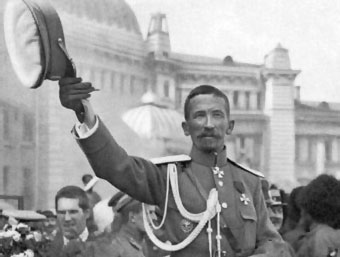One of the elements that happen during Russian Revolution period of 1917-18 was so called Kornilov's Affair.
Ostensively Kornilov wanted to seize power by force and sent General Karpov's Corps to Petrograd (modern St. Peterburg, then capital) to do so. However, Kerenski responded to this threat by freeing and rearming Bolshevik's Red Guards. Rearmed Red Guards then stopped General Karpov's Army Corps close to Petrograd and disarmed it.
Kerenski managed to protect his power and prevented Russia from becoming a military dictatorship similar Franko's Spain or Pinochet's Chilie. Several months later however Kerenski lost that power to the same Bolsheviks and Red Guards he freed to protect that power.
In the accounts of these events there were several irregularities. Most important is the stark difference in narratives of Kerenski on one side and people close to Kornilov on the other. Before the Kornilov's Affair Kerenski and Kornilov communicated with each other via letters.
When Kerenski retold the content of these letters, he claimed that in them Kornilov's proposed making himself Supreme Ruler of Russia and abolishing position of Prime Minister. When Kerenski refused this proposal, Kornilov responded with sending military to Petrograd, because he believed Kerenski was controlled by Bolsheviks. Thus, Kerenski had no choice but to protect himself from a military coup.
While Generals close to Kornilov however deny that they wanted to take any power by force and only sent military to Petrograd on request of Kerenski.
While Kerenski's account seems more credible simply because the fact of sending military to Petrograd does smell of coup, there are still several issues with that version. First is that it would be stupid for Kornilov to disclose such plans in advance in correspondence. It would be more prudent to keep coup intentions hidden until the last moment. Second is the fact that General Karpov surrendered instead of fighting against Red Guards. If they intended to stage the coup, they would likely have fought in this situation.
There could be counter arguments, like Kornilov could have believed that Kerenski was the kind of person to give up power voluntary or that soldiers of Karpov's Corps simply defected to Red Guards, a typical problem for Civil War era White Army.
However, I think there is a different reason why events have unfolded this way: tampering with correspondence.
To put it simply someone sympathetic to Bolsheviks or affiliated with them, simply switched letters midway between Kerenski and Kornilov. One of the intermediaries in charge of delivering letters could have easily done something like that. Then someone with good forging skills have altered content of the letters and pass the fabricated letters to each recipient.
Kornilov would have get a request to reinforce Petrograd with a army corps that Kerenski did not send. Kerenski would get a proposal to give up his power to Kornilov, that Kornilov did not sent.
Both of these letters were deliberately fabricated by Bolsheviks to clash Kornilov and Kerenski. After all it were Bolsheviks who benefited from the whole mess most. Their Red Guards, who were imprisoned after unsuccessful May coup, were now freed and could try to take power again.
Differences in account between Kerenski and Generals as well as the other reasons outlined above all point out towards this conclusion. Finally, Bolsheviks are known to be dishonest and had a history of fabricating facts to suit their objectives.
This Bolshevik's tampering with correspondence between Kornilov and Kerenski was the likely reason behind the Kornilov Affair. These events paved way for them to take power in later stages of the revolution.



No comments:
Post a Comment